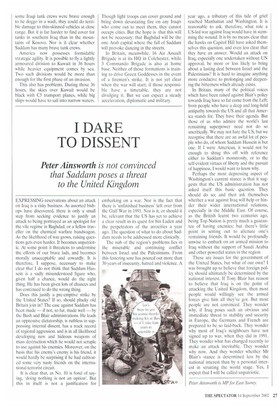I DARE TO DISSENT
Peter Ainsworth is not convinced
that Saddam poses a threat to the United Kingdom
EXPRESSING reservations about an attack on Iraq is a risky business. As assorted bishops have discovered, there is only a small step from seeking evidence to justify an attack to being portrayed as an apologist for the vile regime in Baghdad, or a fellow traveller on the chemical warfare bandwagon. As the likelihood of war grows, raising questions gets even harder. It becomes unpatriotic. At some point it threatens to undermine the efforts of our brave lads, and becomes morally unacceptable and cowardly. It is therefore, I suppose, necessary to make clear that I do not think that Saddam Hussein is a sadly misunderstood figure who, given half a chance, would do the right thing. He has been given lots of chances and has continued to do the wrong thing.
Does this justify a pre-emptive strike by the United States? If so, should plucky old Britain join in? The case against Saddam has been made if not, so far, made well — by the Bush and Blair administrations. He leads an oppressive dictatorship, is ruthless in suppressing internal dissent, has a track record of regional aggression, and is in all likelihood developing new and hideous weapons of mass destruction which he would not scruple to use against his enemies. Moreover, on the basis that his enemy's enemy is his friend, it would hardly be surprising if he had cultivated some very nasty friends on the international terrorist circuit.
It is clear that, as No. 10 is fond of saying, 'doing nothing is not an option'. But this in itself is not a justification for embarking on a war. Nor is the fact that there is 'unfinished business' left over from the Gulf War in 1991. Nor is it, or should it be, relevant that the US has yet to achieve a clear result in its quest for bin Laden and the perpetrators of the atrocities a year ago. The question of what to do about Saddam needs to be addressed more clinically.
The nub of the region's problems lies in the miserable and continuing conflict between Israel and the Palestinians. From this festering sore has poured out more than 30 years of insecurity, hatred and violence. A year ago, a tributary of this tide of grief reached Manhattan and Washington. It is reasonable to ask, therefore, what role a US-led war against Iraq would have in stemming the wound. It is by no means clear that the hawks on Capitol Hill have asked themselves this question, and even less clear that they have an answer. Would an attack on Iraq, especially one undertaken without UN approval, be more or less likely to bring about a lasting deal between Israel and the Palestinians? It is hard to imagine anything more conducive to prolonging and deepening the bitterness which already exists.
In Britain, many of the political voices which have been raised against Blair's policy towards Iraq have so far come from the Left; from people who have a deep and long-held antipathy towards the US and all that America stands for. They have their agenda. But those of us who admire the world's last remaining superpower need not do so uncritically. We may not hate the US, but we recognise that there are an awful lot of people who do, of whom Saddam Hussein is but one. If I were American, it would not be enough to shrug this off with reference either to Saddam's monstrosity, or to the self-evident virtues of liberty and the pursuit of happiness. I would want to know why.
Perhaps the most depressing aspect of Washington's current stance is that it suggests that the US administration has not asked itself this basic question. They should do so; and then ask themselves whether a war against Iraq will help or hinder their wider international relations, especially in the Middle East, Of course, as the British learnt two centuries ago, being Top Nation is pretty much a guarantee of having enemies; but there's little point in setting out to alienate one's remaining friends. It would be profoundly unwise to embark on an armed mission to Iraq without the support of Saudi Arabia and other powerful states in the region.
These are issues for the government of the United States, but what of our own? was brought up to believe that foreign policy should ultimately be determined by the national interest. If Tony Blair has reason to believe that Iraq is on the point of attacking the United Kingdom, then most people would willingly see the armed forces give him all they've got. But most people are not convinced. They wonder why, if Iraq poses such an obvious and immediate threat to stability and security in Europe, the Germans and French are prepared to be so laid-back. They wonder why most of Iraq's neighbours have not signed up to war, when they did in 1991. They wonder what has changed recently to make an attack inevitable. They wonder why now. And they wonder whether Mr Blair's stance is determined less by the national interest than by a personal interest in strutting the world stage. Yes, I expect that I will be called unpatriotic.
Peter Ainsworth is MP for East Surrey.










































































 Previous page
Previous page